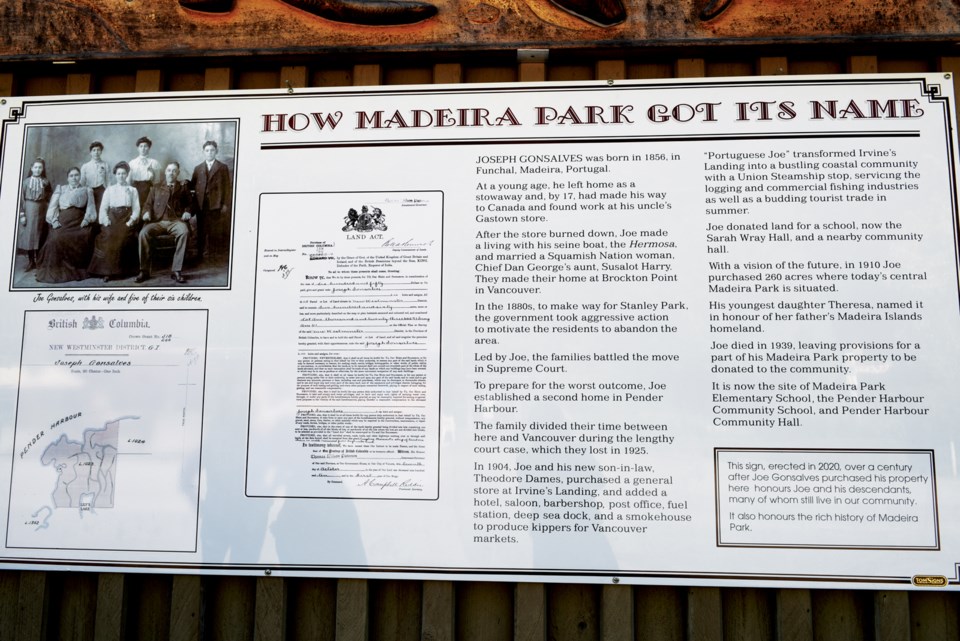Last Friday, 11 direct descendants of Susan Harris and Joe Gonsalves clustered around the Pender Harbour Community Hall to celebrate a sign.
This one was all theirs.
The family raised the money for it, dug through family photographs, unearthed historical documents, sought permission from the Pender Harbour Community Club and on May 15 gathered with a ladder and tools to install it on the side of Pender Harbour Community Hall.
With the sign, which measures four by eight feet, they hope now everyone will know how the unincorporated community of Madeira Park got its name – even if that name doesn’t last much longer.
“It’s for the community and the visitors. There’s going to be a lot of local people here who probably don’t even know that history. So they’re really going to think it’s cool,” said Jane Reid, moments after the sign was installed.

Reid, a former Sunshine Coast Regional District (SCRD) Area A director, was the lead organizer. She described the initiative as a “family effort.” Her husband, Malcolm Duncan, is the great-grandson of Joseph Gonsalves and Susan Harris.
Gonsalves, originally from the Portuguese Madeira Islands, purchased 260 acres (105 ha) of land in Pender Harbour for $650 in 1910. The name Madeira Park honours his birthplace.
On the sign, to the left of a map and land sale document is a family portrait, with Gonsalves, Harris and four of their daughters – though it’s unclear which daughter is which. “I don’t think the youngest daughter is in the picture,” Reid told Coast Reporter as she scrutinized the sign. That leaves the four remaining: Armenia, Matilda, Virginia and Lizzie. A sixth child, a son, died young.
Lizzie never left the area. She married a blacksmith and fisherman, last name Duncan, first name George. They lived in Duncan Cove. Reid and Malcolm now live in their house. When Malcolm was in his forties, he looked a little like Joe in that photograph, Reid said. “Seven generations have lived here and they’re very proud of their heritage.”
Marlene Cymbalist, president of the community club, said the board endorsed the sign because it answers a question many have asked. “We’re a tourist destination and it provides information about our community and how it was established and how the Gonsalves family was instrumental in the property here,” she said.
According to the sign, Gonsalves arrived in Canada as a stowaway at the age of 17. He married Susalot (Susan) Harris, from Squamish Nation. They moved to what’s now known as Pender Harbour after they left Brockton Point under pressure from the government as it pushed to establish Stanley Park. Gonsalves fought the move in the Supreme Court and lost.
Once in Pender Harbour he launched a number of businesses, according to the sign. “‘Portuguese Joe’ transformed Irvines Landing into a bustling coastal community with a Union Steamship stop, servicing the logging and commercial fishing industries as well as a budding tourist trade in summer.”
After his death in 1939, part of his property was donated to the community. Madeira Park Elementary School, the Pender Harbour Community School and the hall on which his new sign rests, now occupy that land.
Gonsalves’ instrumental role in the area’s development is why Reid and descendants are resisting another kind of change.
“I’m really worried about us losing our marine heritage history here. That was another reason for us to do the sign now,” Reid told Coast Reporter.
As part of the Foundation Agreement, signed by shíshálh Nation and the province in 2018, the unincorporated community of Madeira Park could be getting a name change.
The province’s Geographical Names Division has been seeking input from the SCRD to rename the unincorporated community salalus.
The she shashishalhem name refers to the entrance to the channel, fishing sites and village near Sechelt Band Land 20, which is located near the commercial area of Madeira Park.
The SCRD has yet to provide its official response, which will incorporate community feedback and is expected by Aug. 28. Area A director Leonard Lee, who watched the sign go up, said he’s received 50 letters opposing the name change so far.
He said dropping the name Madeira Park could mean “losing one of the names that was actually given by the people instead of some colonial guy in England. This is one of the few places that were named by people that lived here and still live here. There’s not too many names like that on the Coast.”
The history of the area goes well beyond Gonsalves, however. Shíshálh Nation chief Warren Paull told Coast Reporter the area was “our gathering place for winter potlatch ceremonies, births, names, weddings, deaths. All those things were dealt
with late October through February. Each family had to book time.”
That history could be revitalized with she shashishalhem names, even as the Nation strives to keep its language intact. “We’re not trying to change what was, all we’re doing is adding to,” he said. “It’s just a blanket recognition that First Nations were here.”
But for Reid, installing the sign means keeping her family’s version of history alive. “If the place gets renamed, which we all hope it doesn’t … it never will be anything but Madeira to us.”



